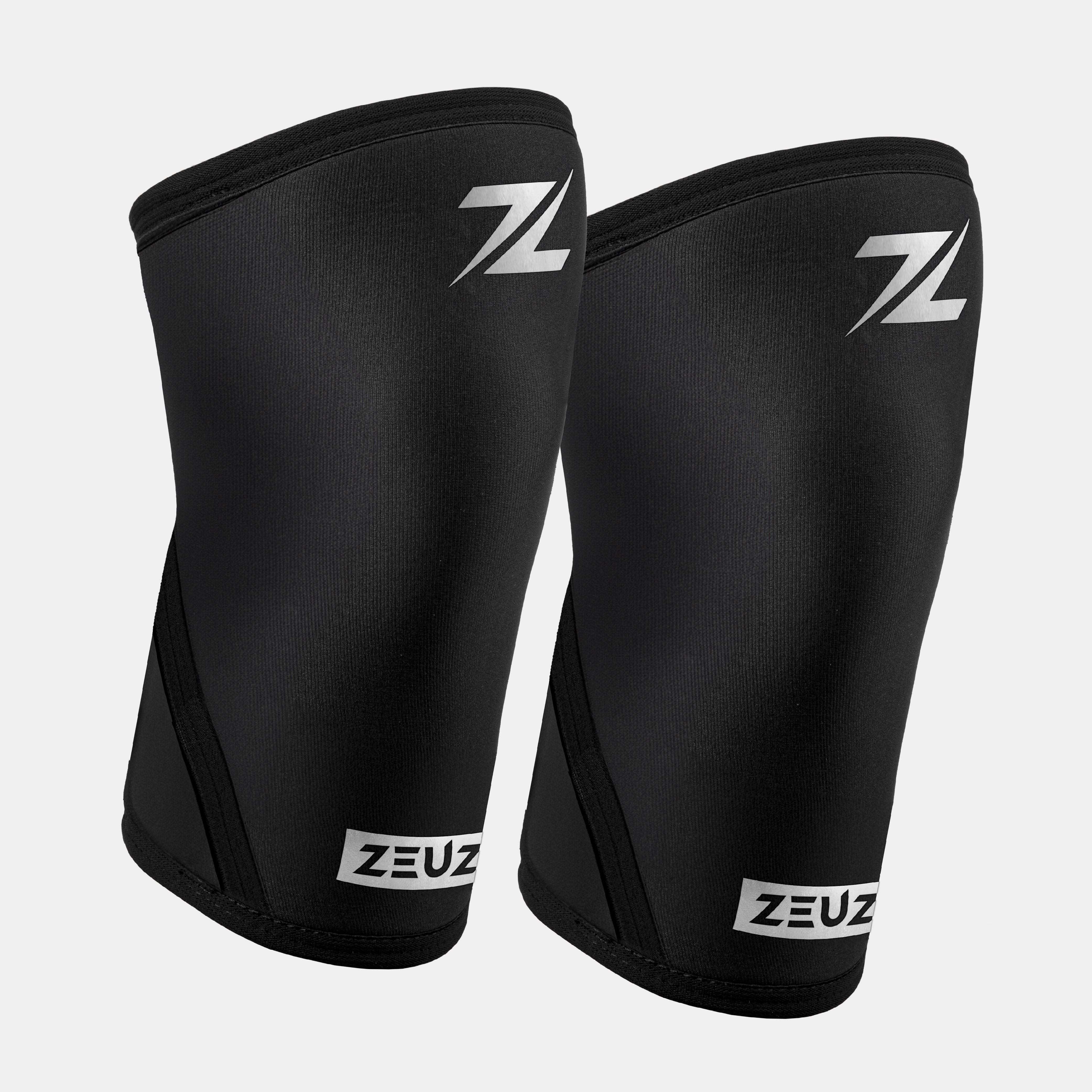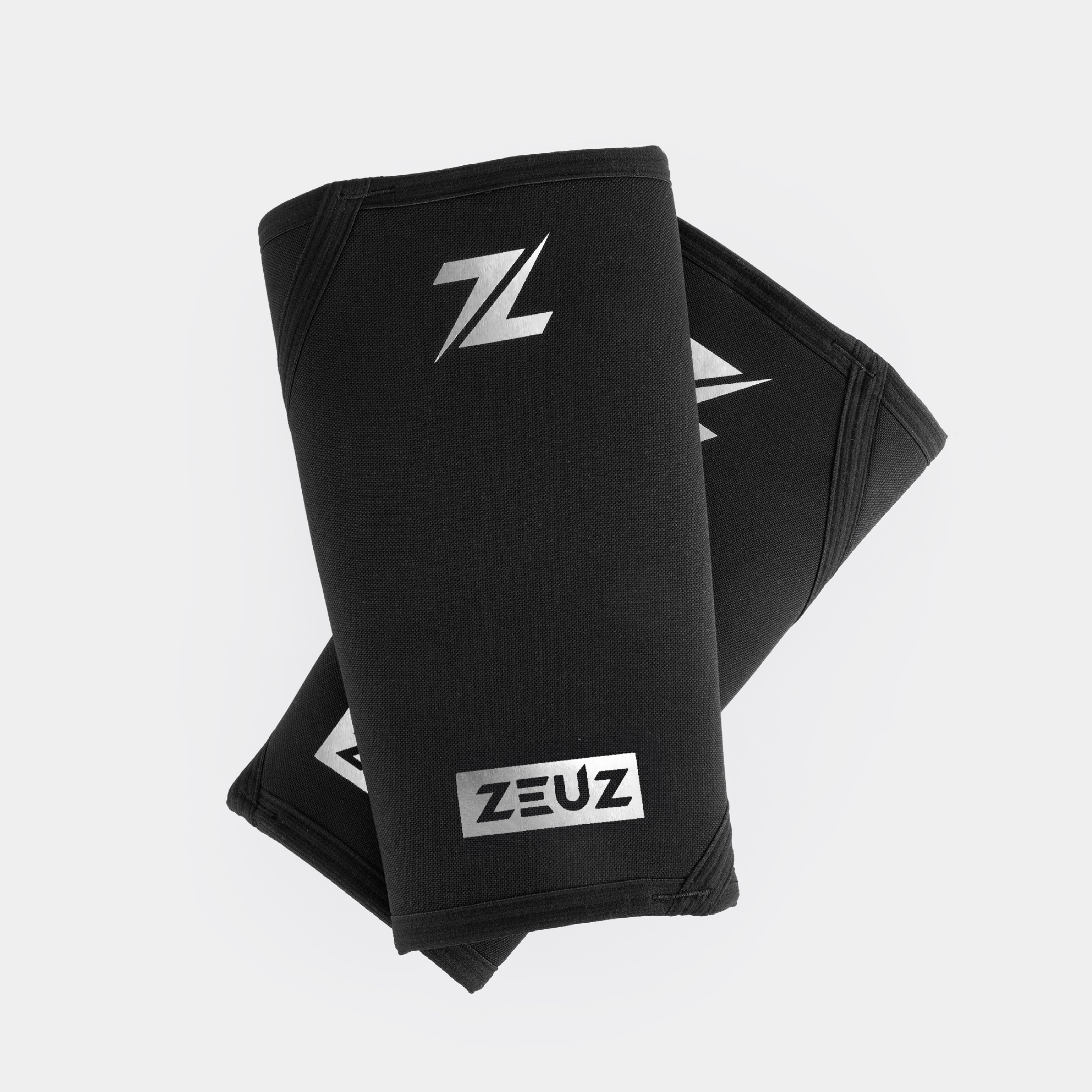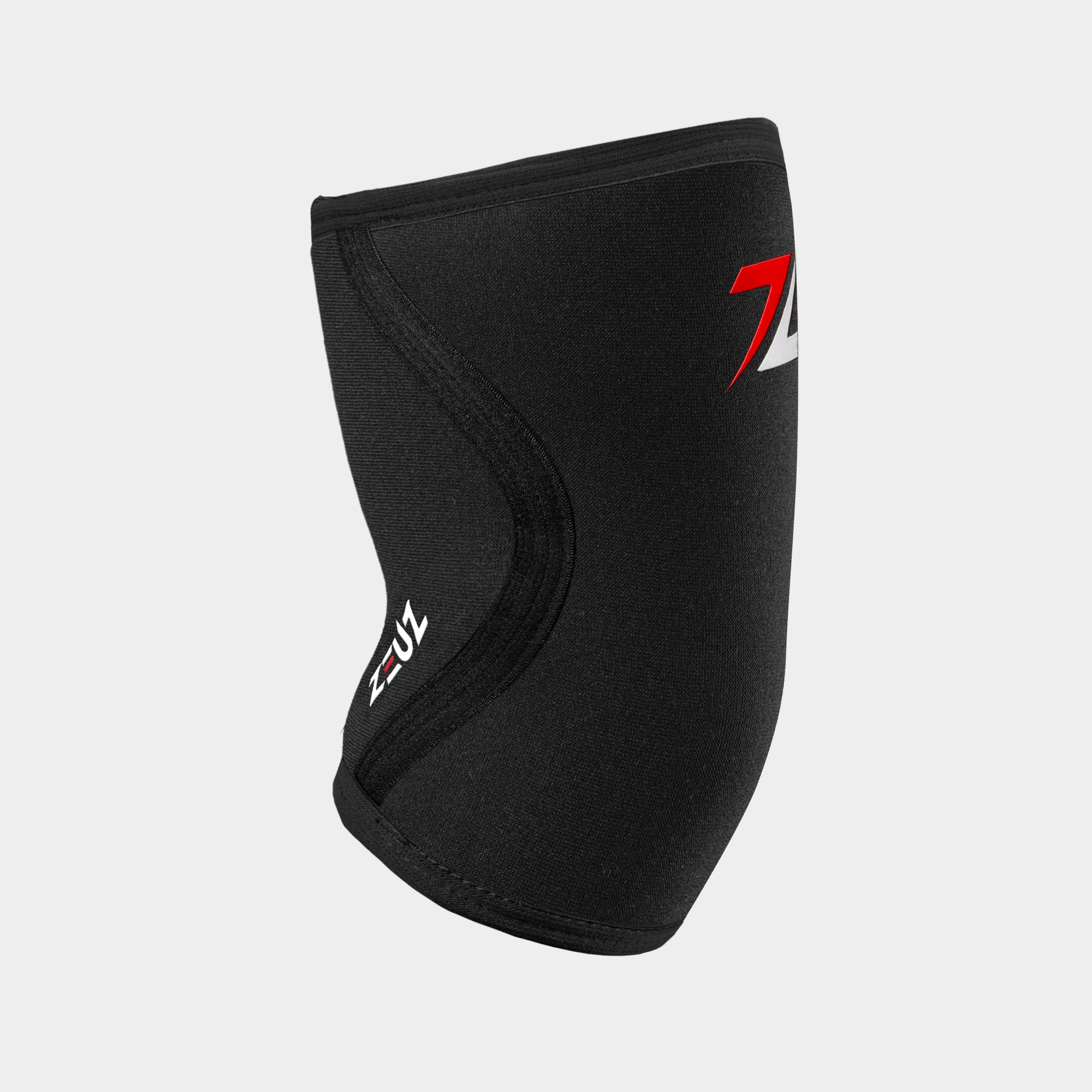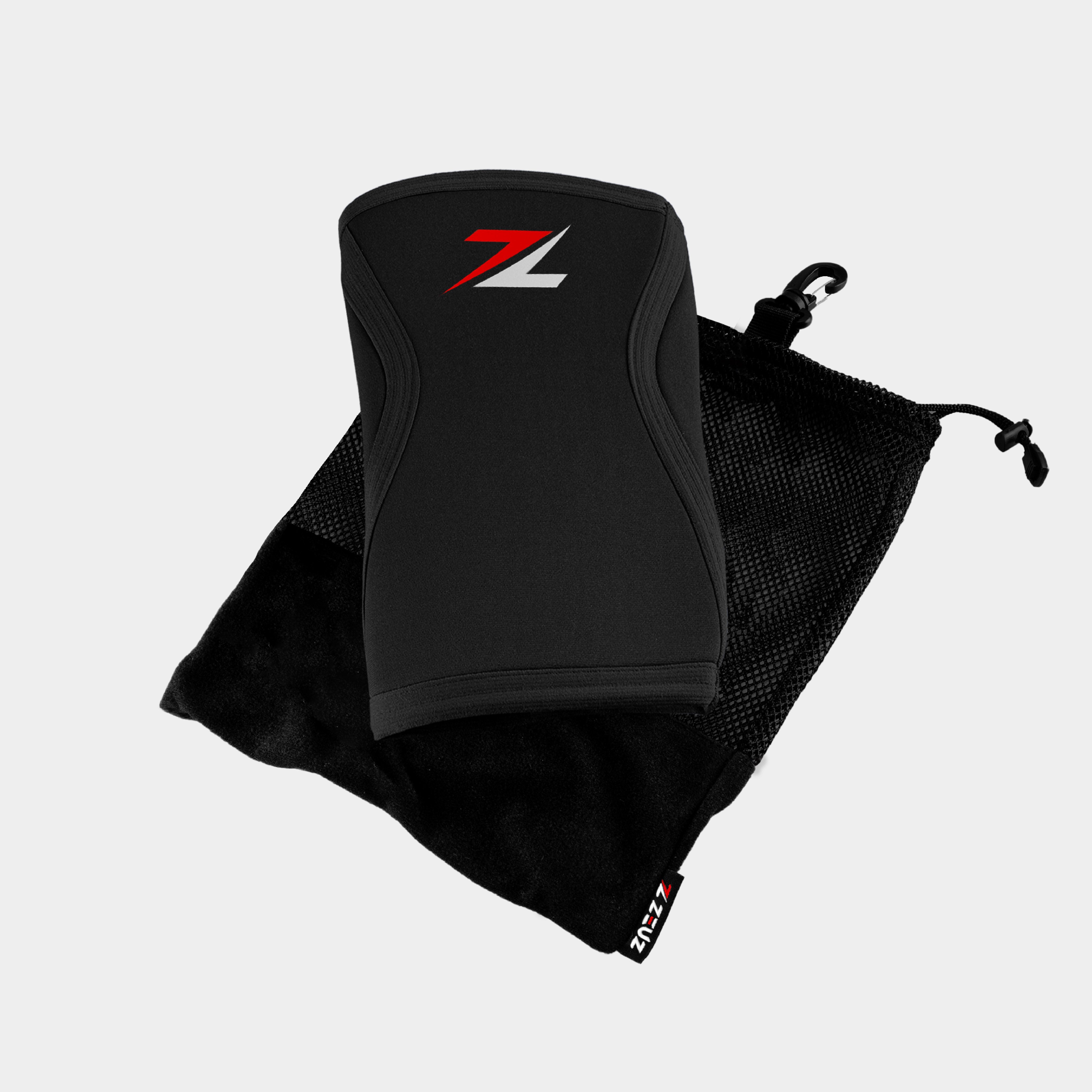Fitness sleeves
Heavy squats, explosive presses, and brute lifts, strength training is great, but your joints take quite a beating. Knees protesting with every rep, elbows acting up after a heavy bench press... familiar? Then it's time to seriously consider fitness sleeves.
Why train with fitness sleeves?
You see them more and more in the gym: athletes with tight sleeves around their knees or elbows. Not because it looks cool, but because they know how important joint support is during heavy lifts. Because sleeves:
- Stability and control:
Fitness sleeves keep your joints firmly in place, ensuring they don't move unnecessarily during heavy lifts. This helps you improve your technique and reduce the risk of injuries by providing extra control over your joint movements. - Reducing impact on joints:
Especially during heavy exercises like squats, deadlifts, or overhead presses, your knees and elbows can undergo a lot of stress. Sleeves help reduce the impact by providing extra compression and support, lowering the chance of joint damage. - Heat retention and improved performance:
The compression of sleeves keeps your joints warm, which is important for promoting blood circulation. Warm joints perform better because they move more smoothly and are less prone to injuries. Additionally, heat helps reduce stiffness, which is essential for good mobility during training. - Preventing incorrect movements:
Especially during exercises like squats, it is important that your knees stay properly aligned. Fitness sleeves can help prevent your knees from collapsing inward, which leads to poor technique and possible injuries. They provide the stability you need to maintain the correct posture. - Support for minor injuries or overuse:
If you are recovering from a minor injury or if your joints are overused, sleeves can be a valuable tool. They provide extra support and compression, which helps reduce pain and discomfort during training without worrying about further damage.
Want to improve your grip during heavy lifts as well? Then combine your fitness sleeves with sturdy grips for more control and less strain on your hands.
Which sleeves do you need?
When choosing the best knee sleeves or arm sleeves, it is important to know what support you need, as they offer different benefits depending on your goals. Whether you train for strength, hypertrophy, or just for comfort and protection, there is always a sleeve that suits you. Below the most popular types of sleeves are explained so you can make the best choice for your training.
1. KNEE SLEEVES FITNESS
Knee sleeves are an essential tool for any strength trainer doing heavy lifts like squats, deadlifts, or lunges. They not only provide extra stability for your knees but can also contribute to better performance and injury protection. These sleeves are designed to support the knee joints and help you push your limits without the risk of overuse.
Benefits of knee sleeves for fitness:
- Support during heavy lifts: Knee sleeves provide extra stability to your knees, which is especially important during heavy squats or deadlifts. They help distribute pressure more evenly over the joint, giving you more control during the exercise.
- Heat retention and circulation: The compression of knee sleeves keeps your knees warm, which promotes blood circulation. This is crucial for reducing stiffness and improving performance, especially during longer or more intense workouts.
- More stability: Due to the extra compression, knee sleeves offer additional stability, making your knees less likely to move or become misaligned. This is not only good for your technique but also for your overall safety.
Tip: Combine your knee sleeves with a leg sock or compression socks for extra comfort and protection during exercises like squats and hip thrusts. The additional support for the legs helps maintain good form and reduces strain on the knees.
2. ELBOW SLEEVES
If you regularly do exercises that heavily load your elbows, such as bench presses, overhead presses, or dips, elbow sleeves can be a gamechanger. These sleeves provide compression and support to reduce the load on your elbow joints and help improve blood circulation, which is crucial for quick recovery and injury reduction.
Benefits of elbow sleeves:
- Reduce joint load: Elbow sleeves help distribute pressure over the joint, reducing the chance of overuse and injuries. This is especially important during heavy lifts where the elbows endure a lot of strain, such as bench presses and overhead presses.
- Ideal for powerlifting and bodybuilding: Elbow sleeves are perfect for intensive training where you heavily use your upper body. They provide the right compression to keep the joint stable, which is especially important when performing heavy sets.
- Better blood circulation: Like knee sleeves, elbow sleeves provide compression that improves blood circulation in the area. This not only helps supply the muscles with oxygen better during your workout but also speeds up recovery after training.
Tip: Use elbow sleeves together with wrist wraps for maximum stability and protection during bench presses and overhead presses. The wrist wraps provide extra support for your wrists, which is a good complement for maintaining proper technique and preventing injuries.
Buying fitness sleeves: what to look for?
Buying the right fitness sleeve for weightlifting can make the difference between good performance and discomfort or even injuries. Not every sleeve is the same, and choosing the right one can have a significant impact on your training. There are several factors to consider to make the perfect choice. Here are the main points to watch out for:
1. THICKNESS OF THE SLEEVE
The thickness of the sleeve affects both the support and flexibility it offers. Depending on your training goals and the types of exercises you do, thick sleeves can play a big role in how well the sleeve performs.
- Neoprene (5mm - 7mm thickness):
Neoprene sleeves are ideal for heavy strength training and provide firm support for your joints. The thicker sleeves from 5mm to 7mm are perfect for exercises like squats, deadlifts, and other heavy lifts. They provide extra compression and heat retention, which helps improve blood circulation and support your joints during heavy efforts. They also offer extra protection against overuse. - Elastic sleeves:
Elastic sleeves are often thinner and offer more freedom of movement. These are perfect for dynamic, functional training like CrossFit or HIIT (High-Intensity Interval Training), where a lot of movement and flexibility are required. They do provide support but are not as stiff as neoprene sleeves, giving you more freedom to move without limiting the flexibility or speed of your movements.
2. FIT AND SIZE
The right sleeve size is essential for both comfort and effectiveness. A sleeve that is too tight can restrict blood circulation and limit your movements. A sleeve that is too loose offers insufficient support and stability, increasing the risk of injuries.
What should you measure?
To determine the right size, measure the circumference of the joint for which you want to use the sleeve. This can be, for example, the circumference of your knee, elbow, or wrist. It is important to measure your joints at the correct point – not too high or too low. This ensures your sleeve fits well and provides the necessary compression without discomfort.
What if you are between two sizes?
If you are between two sizes, it is often best to choose the smaller size. A tighter fit provides more compression and support, but make sure it still feels comfortable and does not restrict your full range of motion.
Tip: If your sleeve feels too tight and you experience pain or discomfort, try a larger size. If the sleeve is too loose and does not provide compression, try a smaller size or choose a sleeve made of firmer material.
3. PURPOSE OF THE SLEEVE
It is important to know what goal you want to achieve with your sleeve, as this affects the type and features you need.
- Knee sleeves:
Knee sleeves are ideal for exercises like squats, deadlifts, and lunges. They provide compression, stability, and warmth, which is important when lifting heavy weights or doing long, intense sets. They help protect your knees from overuse and improve performance by supporting the joint movement support. - Elbow sleeves:
Elbow sleeves are perfect for exercises where you heavily load your upper body, such as bench presses, dips, and overhead presses. These sleeves help relieve pressure on your elbows, reduce the chance of injuries, and improve blood circulation, resulting in a better training experience and recovery. - Compression sleeves:
Compression sleeves are ideal for recovery. They help reduce stiffness and promote blood circulation, which is important for recovery after heavy training sessions. They are not as stiff as sleeves for strength training but provide mild compression that helps muscles recover faster from strain.
Tip: If you train with heavy weights, a sturdy sleeve for your knees or elbows is essential and also gives more confidence during sports. However, if you are more focused on recovery or light exercises, a compression sleeve can help improve muscle function without the restrictions of a stiffer sleeve. This way you can take every workout to the next level.
How to use fitness sleeves properly?
You can't just buy a pair of fitness sleeves and expect to suddenly squat 20 kg more. They only work if you use them correctly.
Wear them during heavy lifts
Use them especially during heavy exercises like squats, presses, and other demanding exercises.
Pull them tight, but not too tight
You want compression, not cut-off blood flow.
Combine them with a good warm-up
Sleeves help, but a proper warm-up remains essential.
Don't use them all the time
You also want to keep training your joints without support to keep them strong.
Frequently Asked Questions about Fitness Sleeves
1. How tight should fitness sleeves be?
Tight enough to provide compression, but not so tight that your blood flow is cut off.
2. Are knee sleeves suitable for beginners?
Yes! They can help improve stability and prevent injuries, regardless of your level.
3. Can I wear elbow sleeves during pull-ups?
You can, but they are mainly intended for exercises that put a lot of pressure on the elbows, such as bench presses and dips.
4. How do I maintain my fitness sleeves?
Rinse them after use and let them air out. Do not wash them too often to preserve elasticity.
5. Why buy fitness sleeves from ZEUZ?
Our sleeves are made from high-quality materials, offer the best support, and last for years!
Order your fitness sleeves today at ZEUZ!
Do you want to train without pain and with maximum support? Then fitness sleeves are an absolute must-have in your gym bag. Knees and elbows take a lot of strain during strength training, so make sure to give them extra support and comfort during your exercises.
Train stronger and safer with the best sleeves. Order now and experience the difference!
FREE SHIPPING FROM €50
For the Netherlands, Belgium & Germany with a delivery time of 1-2 working days. Other countries: 2-5 working days.
SUSTAINABLE & HIGH QUALITY
Our team focuses on developing and producing innovative and sustainable products of the highest quality.
HELPFUL CUSTOMER SERVICE
Your satisfaction is our priority. Our team is ready to provide you with fast and effective support for any questions or problems.
APPROVED BY ATHLETES
By working together with athletes, trainers and gyms, we develop high-quality, sustainable products for optimal performance.
SAFE & FLEXIBLE PAYMENT
Get familiar with our secure payment system and choose from a wide range of payment methods.






